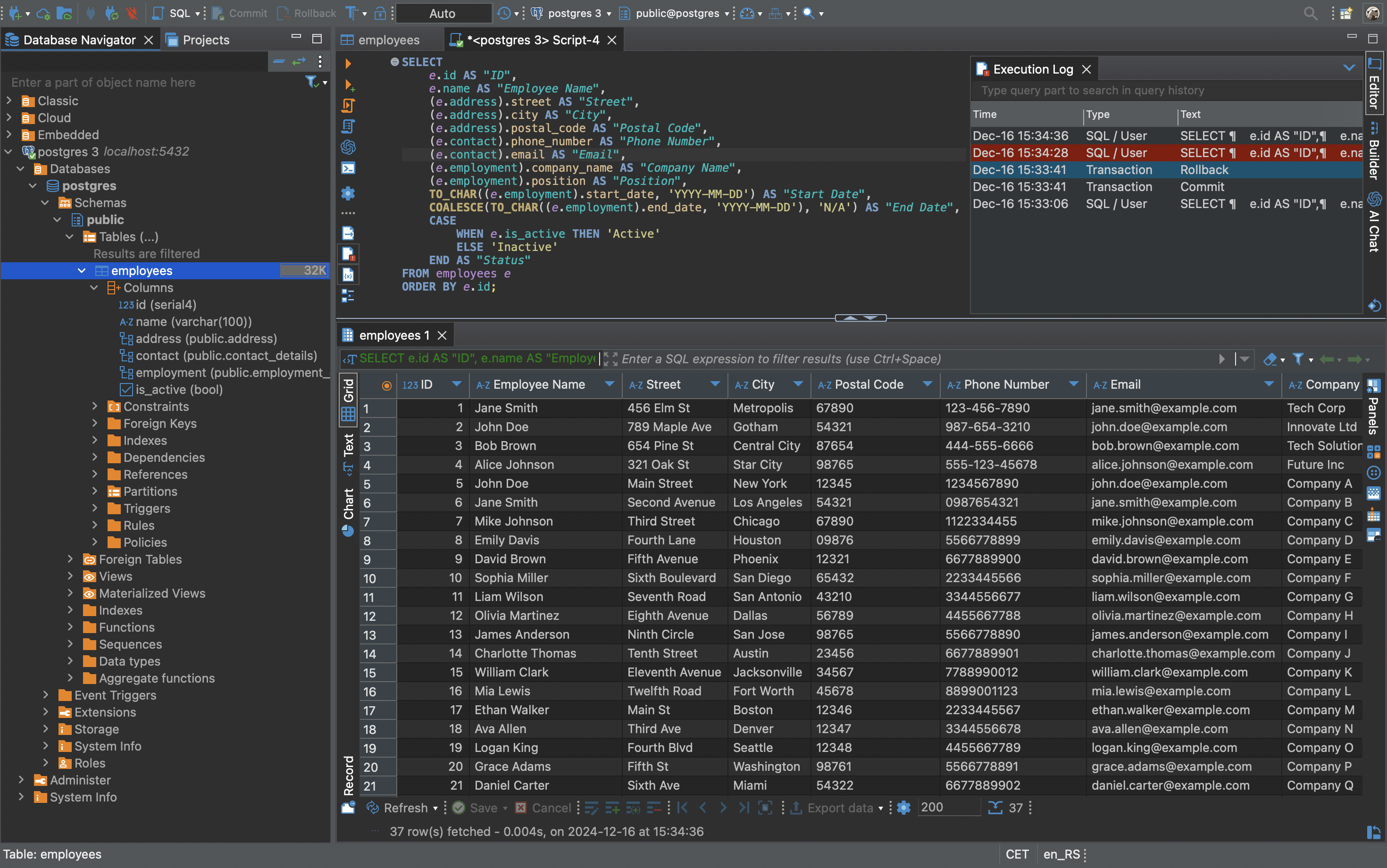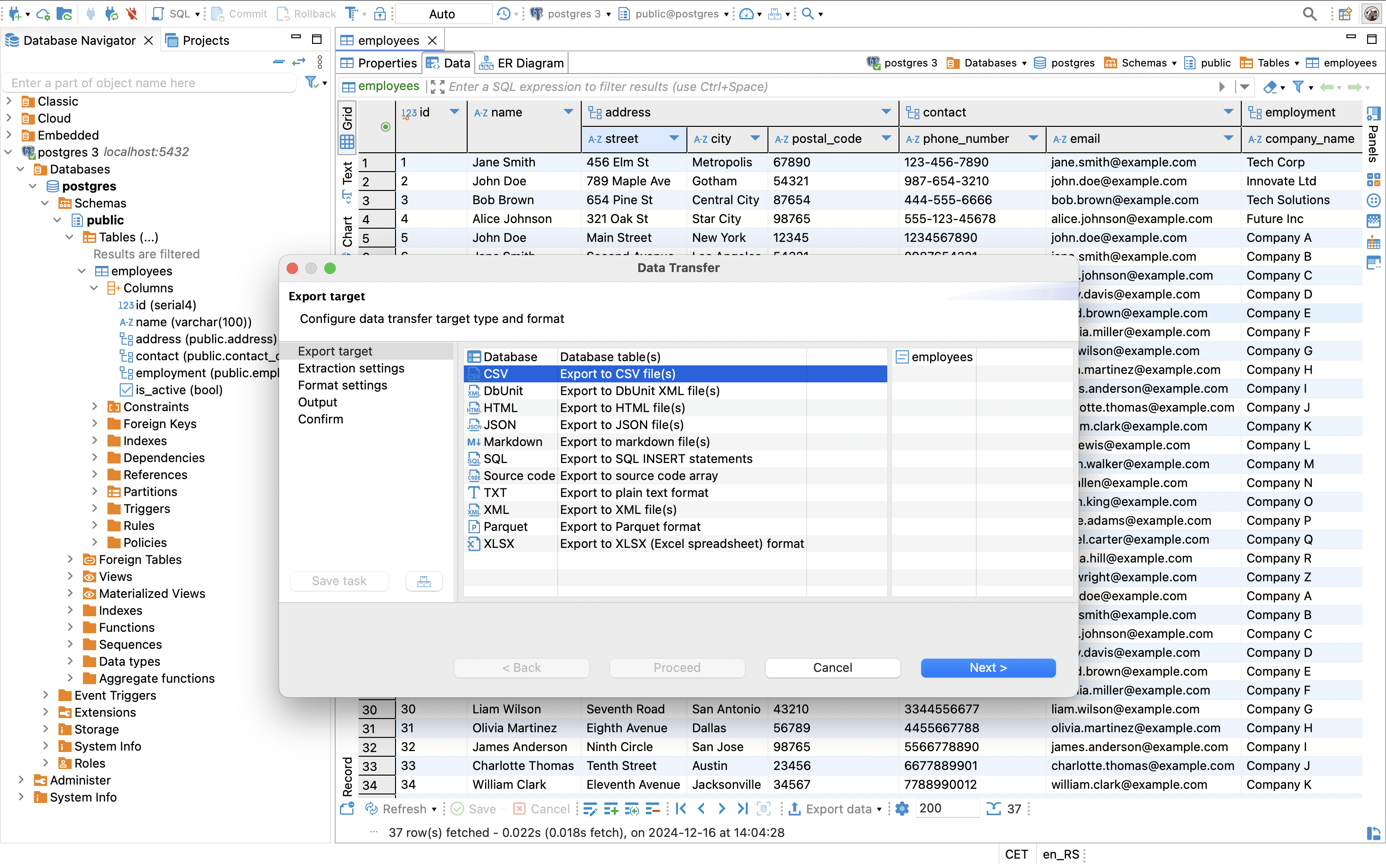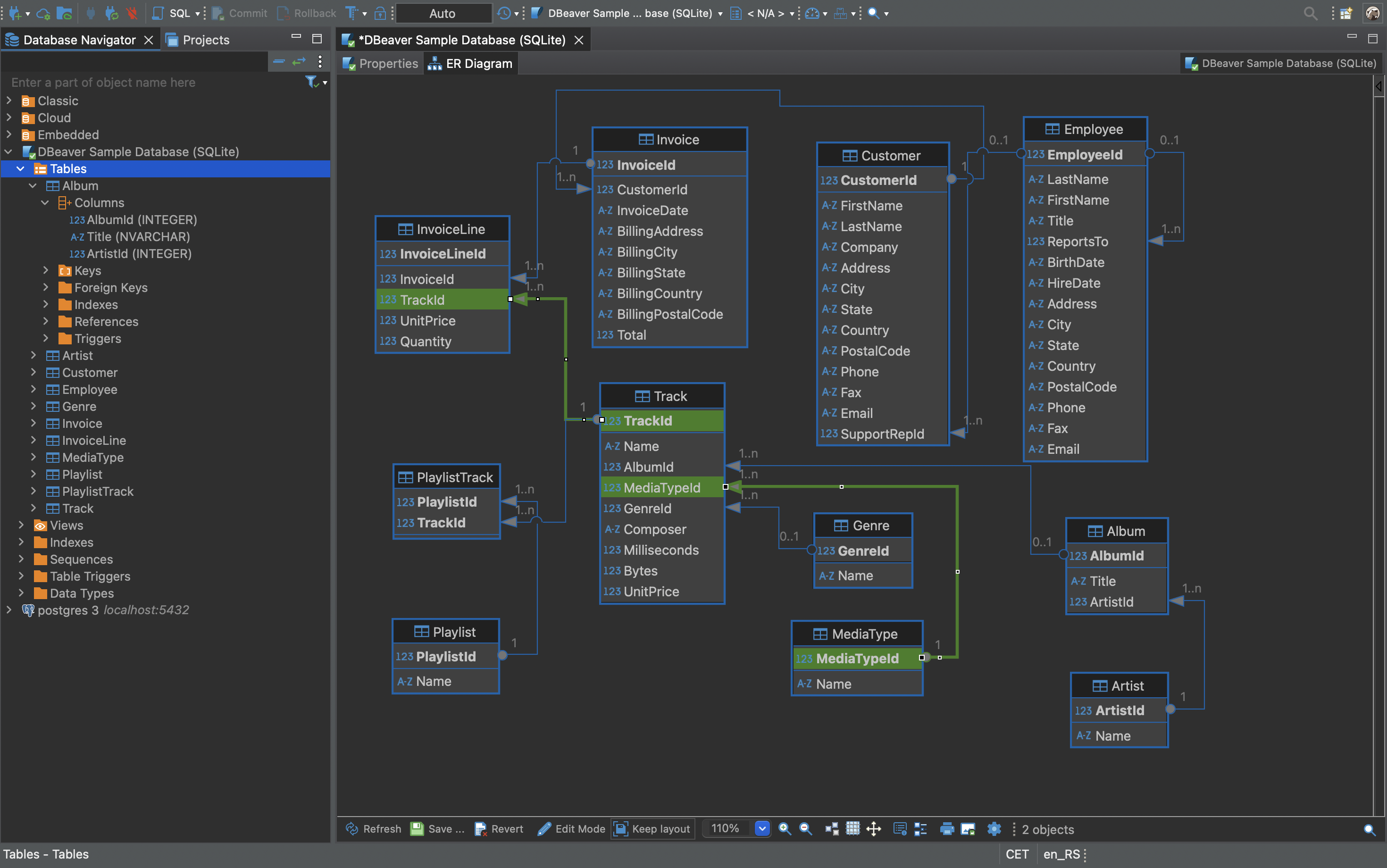
dbeaver
Free universal database tool and SQL client
Stars: 48693
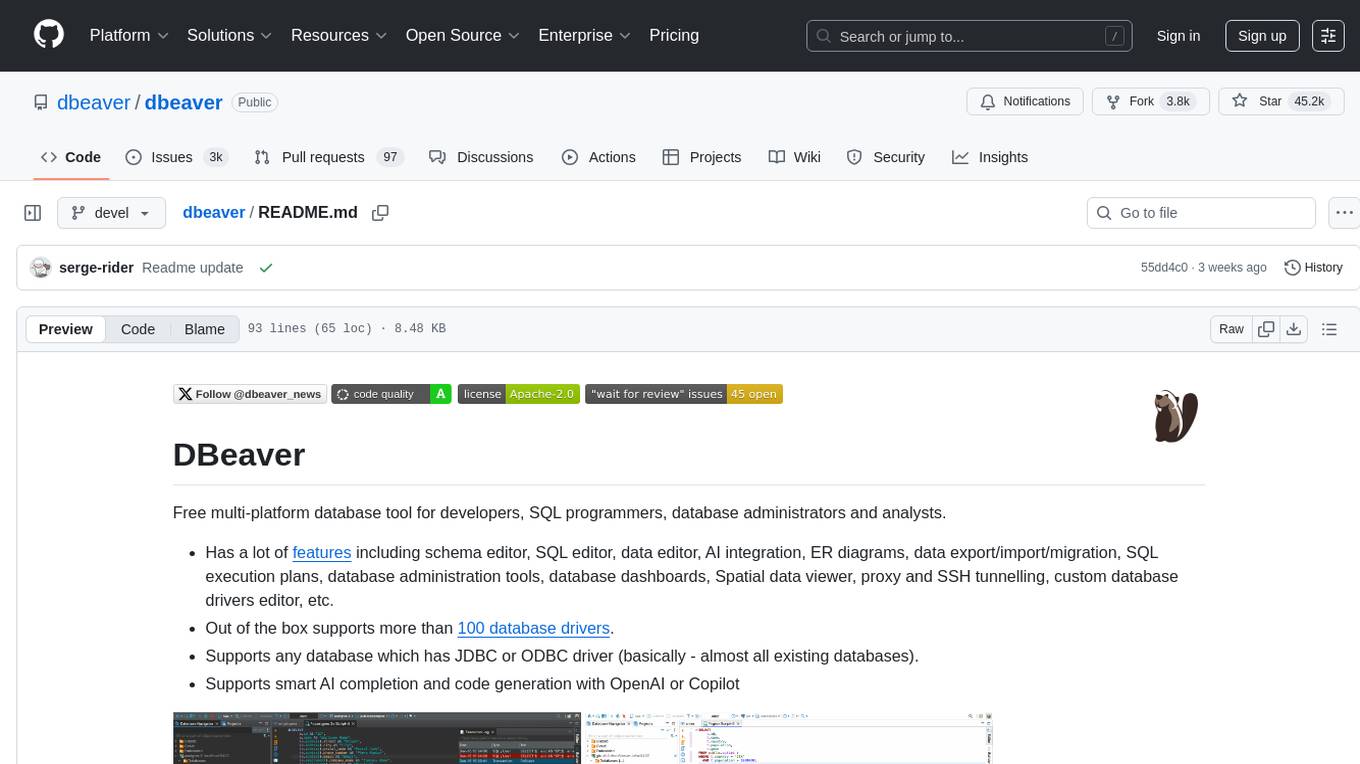
DBeaver is a free multi-platform database tool designed for developers, SQL programmers, database administrators, and analysts. It offers a wide range of features including schema editor, SQL editor, data editor, AI integration, ER diagrams, data export/import/migration, SQL execution plans, database administration tools, database dashboards, Spatial data viewer, proxy and SSH tunnelling, custom database drivers editor, etc. It supports over 100 database drivers out of the box and is compatible with any database that has a JDBC or ODBC driver. DBeaver also supports smart AI completion and code generation with OpenAI or Copilot.
README:
Free multi-platform database tool for developers, SQL programmers, database administrators and analysts.
- Has a lot of features including schema editor, SQL editor, data editor, AI integration, ER diagrams, data export/import/migration, SQL execution plans, database administration tools, database dashboards, Spatial data viewer, proxy and SSH tunnelling, custom database drivers editor, etc.
- Out of the box supports more than 100 database drivers.
- Supports any database which has JDBC or ODBC driver (basically - almost all existing databases).
- Supports smart AI completion and code generation with OpenAI or Copilot
You can download prebuilt binaries from official website or directly from GitHub releases.
You can also download Early Access version. We publish daily.
Just run an installer (or unzip an archive) and run dbeaver.
Note: DBeaver needs Java to run. OpenJDK 21 is included in all DBeaver distributions.
You can change default JDK version by replacing directory jre in dbeaver installation folder.
- DBeaver is written mostly on Java. However, it also uses a set of native OS-specific components for desktop UI, high performance database drivers and networking.
- Basic frameworks:
- OSGI platform for plugins and dependency management. Community version consists of 130+ plugins.
- Eclipse RCP platform for rich user interface build.
- JDBC for basic database connectivity API.
- JSQLParser and Antlr4 for SQL grammar and semantic parser.
- For networking and additional functionality we use wide range of open source libraries such as SSHJ, Apache POI, JFreeChart, JTS, Apache JEXL etc.
- We separate model plugins from desktop UI plugins. This allows us to use the same set of "back-end" plugins in both DBeaver and CloudBeaver.
- Dependencies: being an OSGI application we use P2 repositories for third party dependencies. For additional Maven dependencies we use our own DBeaver P2 repo.
Out of the box DBeaver supports following database drivers: MySQL, MariaDB, Oracle, DB2, PostgreSQL, SQL Server, Sybase, Apache Hive, Drill, Presto, Trino, Phoenix, Exasol, Informix, Teradata, Vertica, Netezza, Firebird, Derby, H2, H2GIS, WMI, Snowflake, Greenplum, Redshift, Athena, SAP HANA, MaxDB, NuoDB, MS Access, SQLite, CSV, DBF, Firebird, TimescaleDB, Yellowbrick, CockroachDB, OrientDB, MonetDB, Google BigQuery, Google Spanner, Apache Hive/Impala/Spark, Apache Ignite, MapD, Azure SQL, CrateDB, Elasticsearch, Ocient, Ingres, OmniSci, Yugabyte, IRIS, Data Virtuality, Denodo, Virtuoso, Machbase, DuckDB, Babelfish, OceanBase, Salesforce, EnterpriseDB, Apache Druid, Apache Kylin, Databricks, OpenSearch, TiDB, TDEngine, Materialize, JDBCX, Dameng, Altibase, StarRocks, CUBRID, GaussDB, DolphinDB, LibSQL, GBase 8s, Databend, Cloudberry, Teiid, Kingbase.
Commercial versions extends functionality of many popular drivers and also support non-JDBC datasources such as:
ODBC, MongoDB, Cassandra, Couchbase, CouchDB, Redis, InfluxDB, Firestore, BigTable, DynamoDB, Kafka KSQL, Neo4j, AWS Neptune, AWS Timestream, Azure CosmosDB, Yugabyte, Salesforce, etc.
Also, we support flat files as databases: CSV, XLSX, Json, XML, Parquet.
You can find the list of all databases supported in commercial versions here.
- For bug reports and feature requests - please create a ticket.
- To promote a ticket to a higher priority - please vote for it with 👍 under the ticket description.
- If you have any questions, ideas, etc - please start a discussion.
- Pull requests are welcome. See our guide for contributors.
- Visit https://dbeaver.com for more information.
- Follow us on X and watch educational video on YouTube
- Thanks for using DBeaver! Star if you like it.
Hooray, we have reached 40k+ stars on GitHub and continue to grow!
That's really cool, and we are glad that you like DBeaver.
- We are actively looking for new source code contributors. We have added labels “Good first issue” and “Help wanted” to some tickets. If you want to be a part of our development team, just be brave and take a ticket. We are happy to reward our most active contributors every major sprint.
- You can buy one of our commercial versions. They include NoSQL databases support, additional extensions, and official online support. Also, licensed users have priorities in bug fixes and the development of new features.
Thank you!
- DBeaver Team (contributors)
CloudBeaver is a web-based database management tool built on the DBeaver platform. It brings the capabilities of DBeaver to the web interface, enabling database management from any device with an internet connection and eliminating the need for local installation.
Supporting any database, CloudBeaver incorporates most of DBeaver's features and includes advanced access management for secure collaboration.
Designed with a user-friendly interface, CloudBeaver simplifies complex database operations and is suitable for both individual developers and organizations. Its scalable architecture accommodates various needs, making it a convenient solution for managing databases anytime and anywhere through web-based accessibility.
For Tasks:
Click tags to check more tools for each tasksFor Jobs:
Alternative AI tools for dbeaver
Similar Open Source Tools

dbeaver
DBeaver is a free multi-platform database tool designed for developers, SQL programmers, database administrators, and analysts. It offers a wide range of features including schema editor, SQL editor, data editor, AI integration, ER diagrams, data export/import/migration, SQL execution plans, database administration tools, database dashboards, Spatial data viewer, proxy and SSH tunnelling, custom database drivers editor, etc. It supports over 100 database drivers out of the box and is compatible with any database that has a JDBC or ODBC driver. DBeaver also supports smart AI completion and code generation with OpenAI or Copilot.
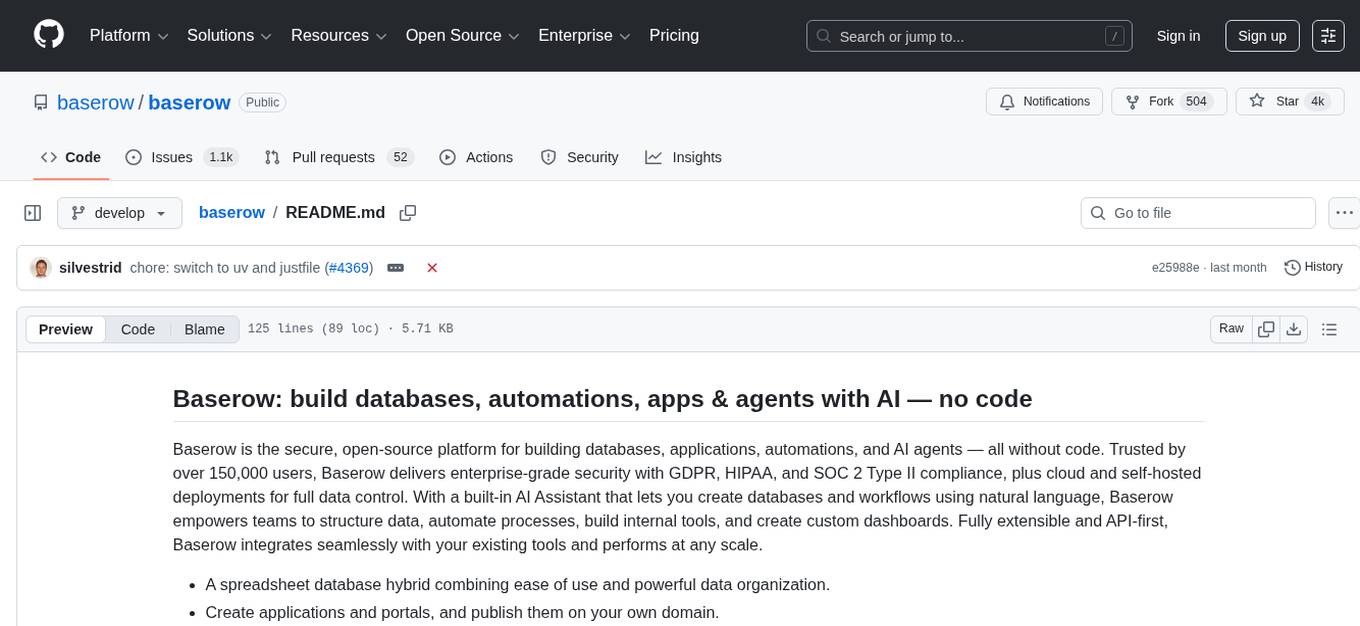
baserow
Baserow is a secure, open-source platform that allows users to build databases, applications, automations, and AI agents without writing any code. With enterprise-grade security compliance and both cloud and self-hosted deployment options, Baserow empowers teams to structure data, automate processes, create internal tools, and build custom dashboards. It features a spreadsheet database hybrid, AI Assistant for natural language database creation, GDPR, HIPAA, and SOC 2 Type II compliance, and seamless integration with existing tools. Baserow is API-first, extensible, and uses frameworks like Django, Vue.js, and PostgreSQL.
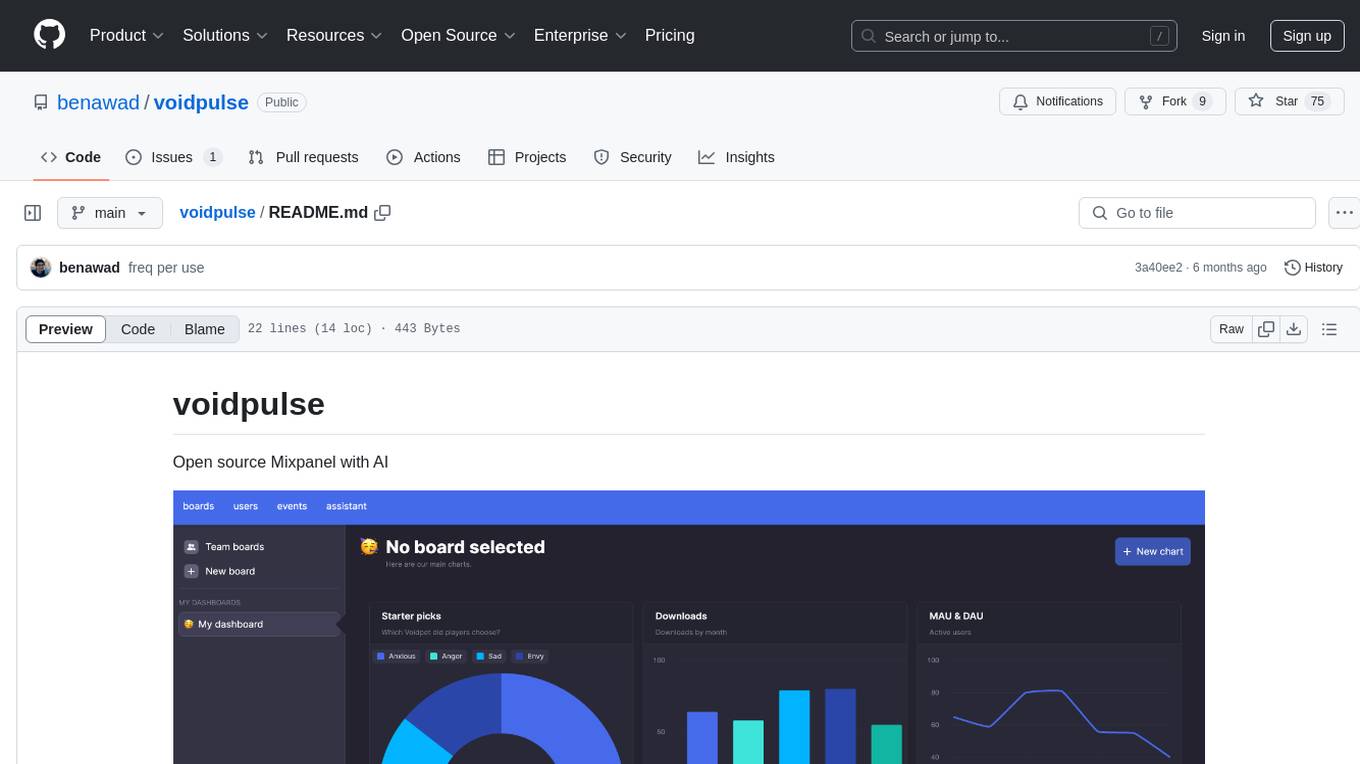
voidpulse
Voidpulse is an open-source Mixpanel alternative with AI capabilities. It is currently in private beta and being used in production for the Voidpet app. The project aims to provide analytics functionalities without the high cost associated with other tools. It is built using React, Typescript, Next.js on the frontend, and Node.js with TRPC & Drizzle ORM on the backend. Data is stored in Postgresql, Clickhouse is used for storing/querying events, Kafka for batch event insertion, and Redis for caching.

Genkit
Genkit is an open-source framework for building full-stack AI-powered applications, used in production by Google's Firebase. It provides SDKs for JavaScript/TypeScript (Stable), Go (Beta), and Python (Alpha) with unified interface for integrating AI models from providers like Google, OpenAI, Anthropic, Ollama. Rapidly build chatbots, automations, and recommendation systems using streamlined APIs for multimodal content, structured outputs, tool calling, and agentic workflows. Genkit simplifies AI integration with open-source SDK, unified APIs, and offers text and image generation, structured data generation, tool calling, prompt templating, persisted chat interfaces, AI workflows, and AI-powered data retrieval (RAG).
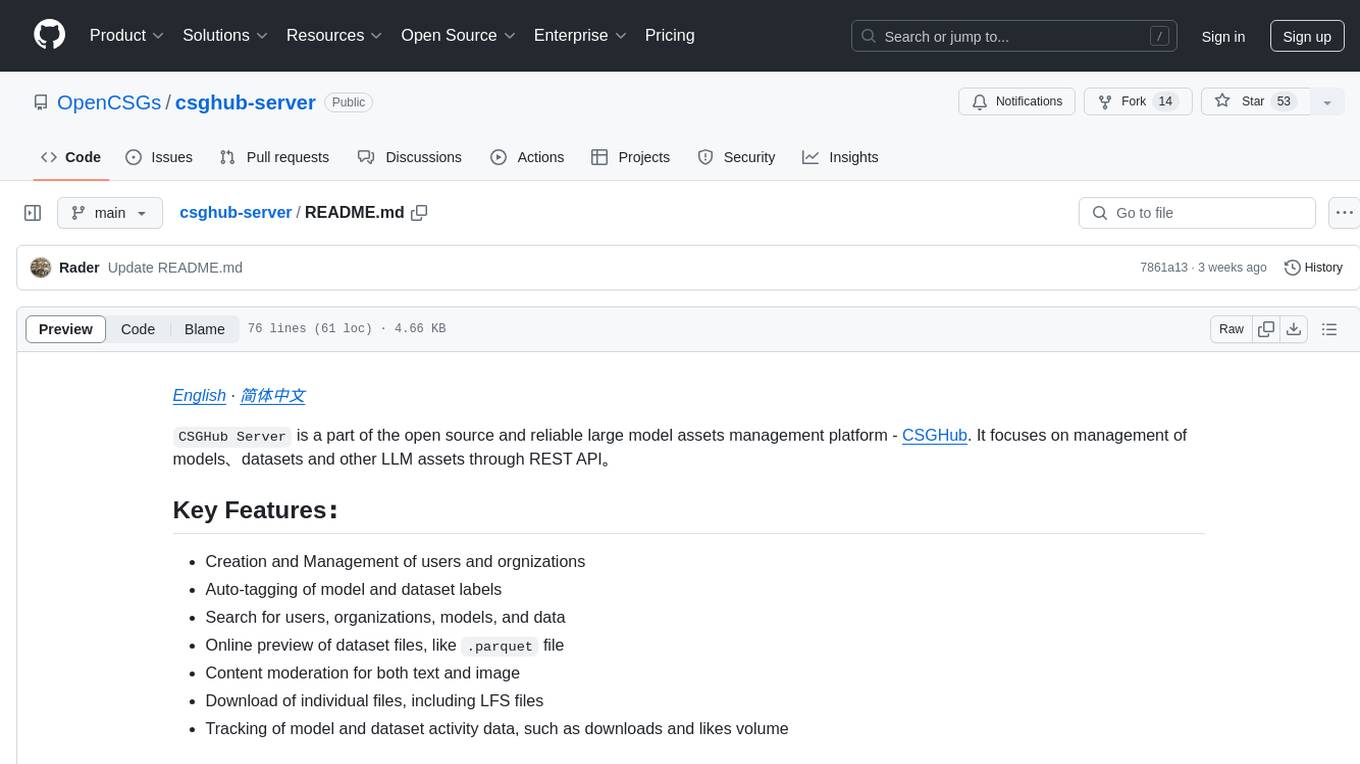
csghub-server
CSGHub Server is a part of the open source and reliable large model assets management platform - CSGHub. It focuses on management of models, datasets, and other LLM assets through REST API. Key features include creation and management of users and organizations, auto-tagging of model and dataset labels, search functionality, online preview of dataset files, content moderation for text and image, download of individual files, tracking of model and dataset activity data. The tool is extensible and customizable, supporting different git servers, flexible LFS storage system configuration, and content moderation options. The roadmap includes support for more Git servers, Git LFS, dataset online viewer, model/dataset auto-tag, S3 protocol support, model format conversion, and model one-click deploy. The project is licensed under Apache 2.0 and welcomes contributions.

genkit
Firebase Genkit (beta) is a framework with powerful tooling to help app developers build, test, deploy, and monitor AI-powered features with confidence. Genkit is cloud optimized and code-centric, integrating with many services that have free tiers to get started. It provides unified API for generation, context-aware AI features, evaluation of AI workflow, extensibility with plugins, easy deployment to Firebase or Google Cloud, observability and monitoring with OpenTelemetry, and a developer UI for prototyping and testing AI features locally. Genkit works seamlessly with Firebase or Google Cloud projects through official plugins and templates.
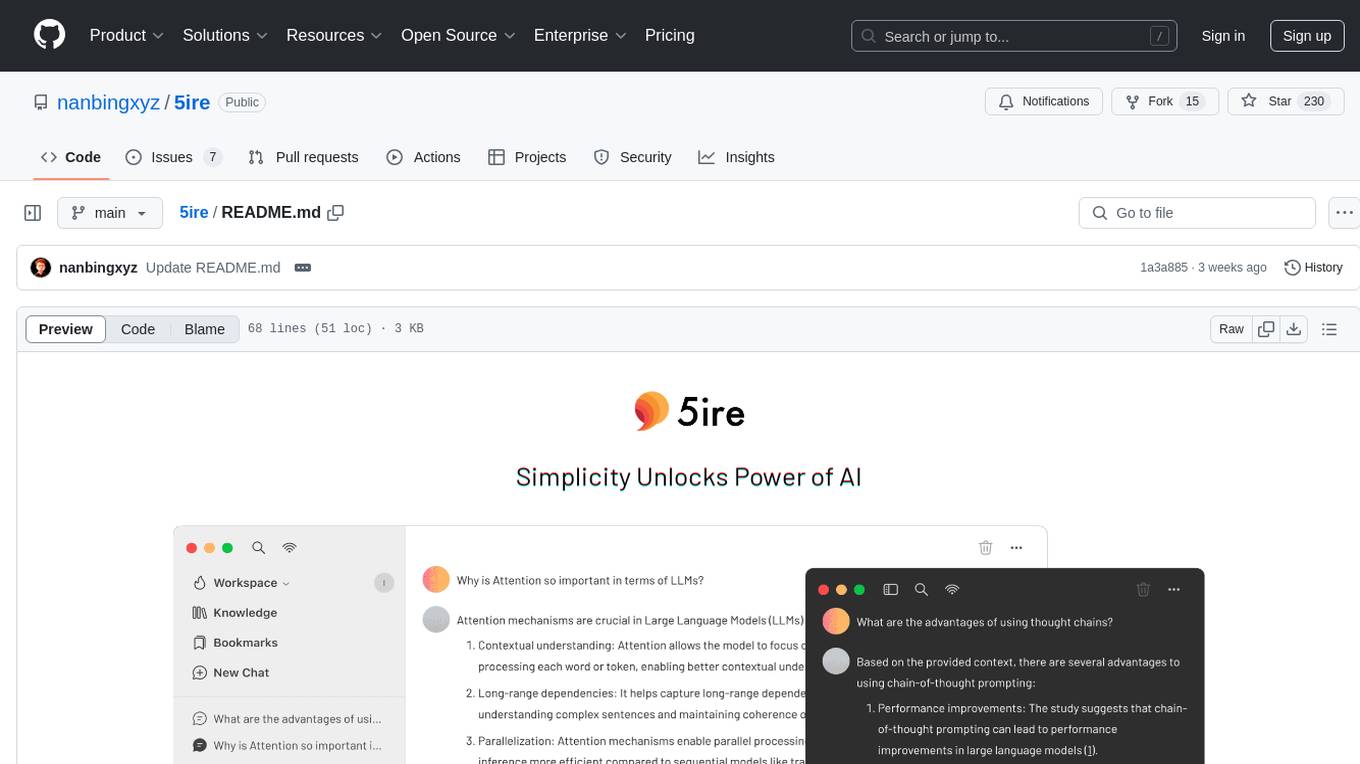
5ire
5ire is a cross-platform desktop client that integrates a local knowledge base for multilingual vectorization, supports parsing and vectorization of various document formats, offers usage analytics to track API spending, provides a prompts library for creating and organizing prompts with variable support, allows bookmarking of conversations, and enables quick keyword searches across conversations. It is licensed under the GNU General Public License version 3.
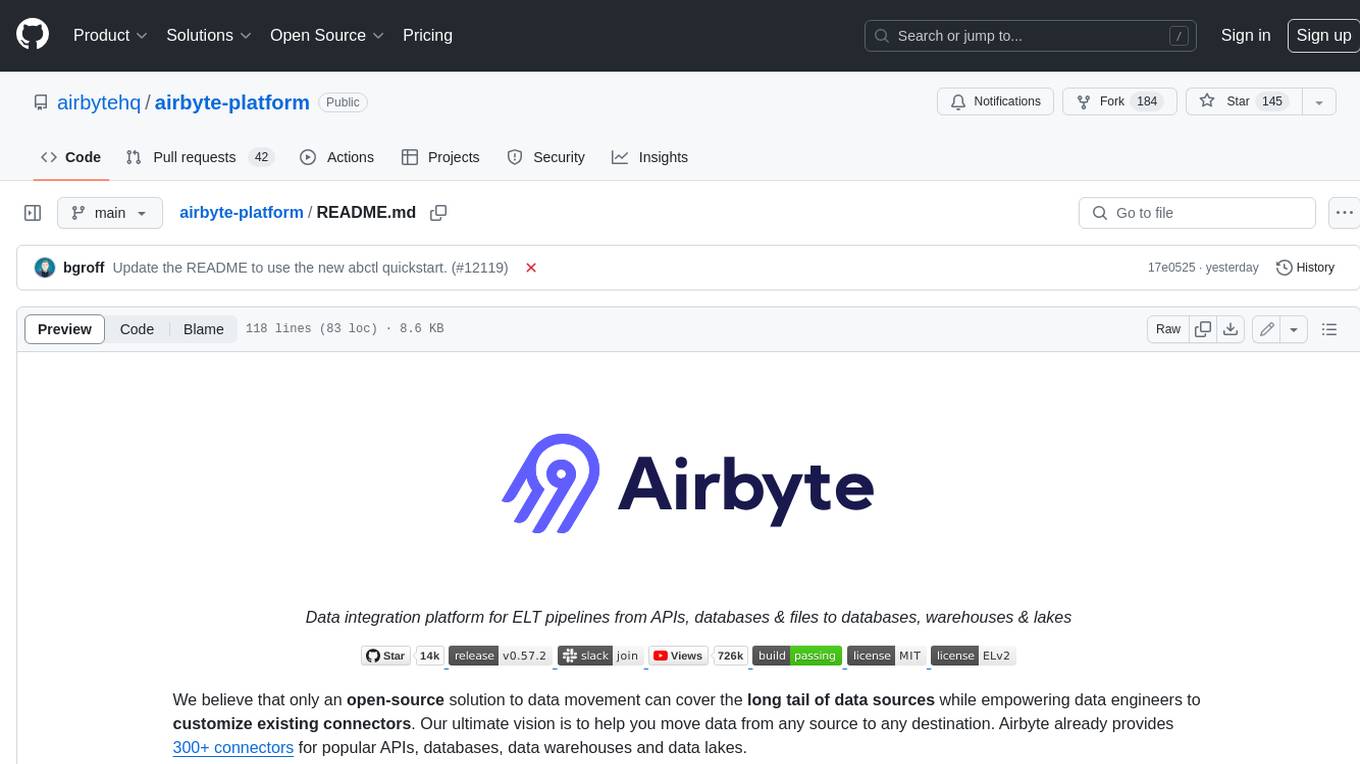
airbyte-platform
Airbyte is an open-source data integration platform that makes it easy to move data from any source to any destination. With Airbyte, you can build and manage data pipelines without writing any code. Airbyte provides a library of pre-built connectors that make it easy to connect to popular data sources and destinations. You can also create your own connectors using Airbyte's low-code Connector Development Kit (CDK). Airbyte is used by data engineers and analysts at companies of all sizes to move data for a variety of purposes, including data warehousing, data analysis, and machine learning.
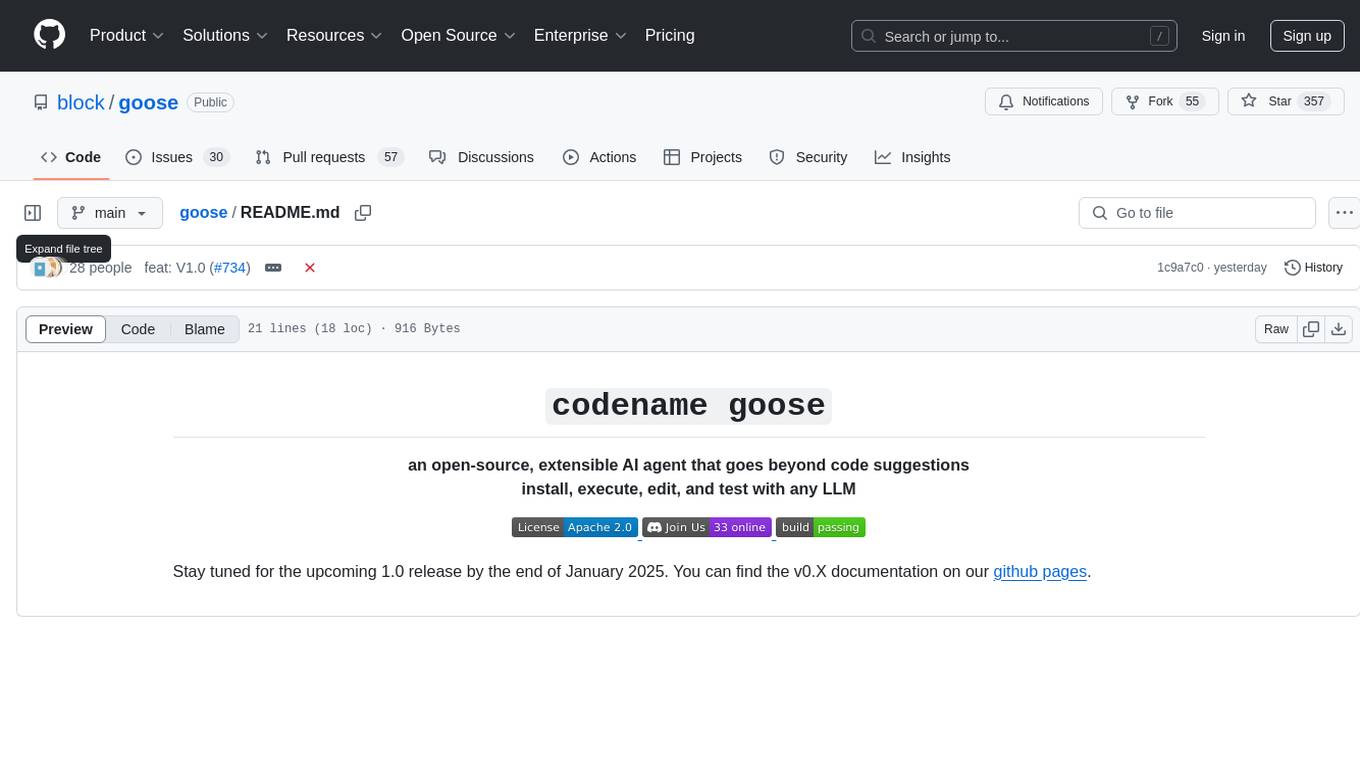
goose
Codename Goose is an open-source, extensible AI agent designed to provide functionalities beyond code suggestions. Users can install, execute, edit, and test with any LLM. The tool aims to enhance the coding experience by offering advanced features and capabilities. Stay updated for the upcoming 1.0 release scheduled by the end of January 2025. Explore the v0.X documentation available on the project's GitHub pages.
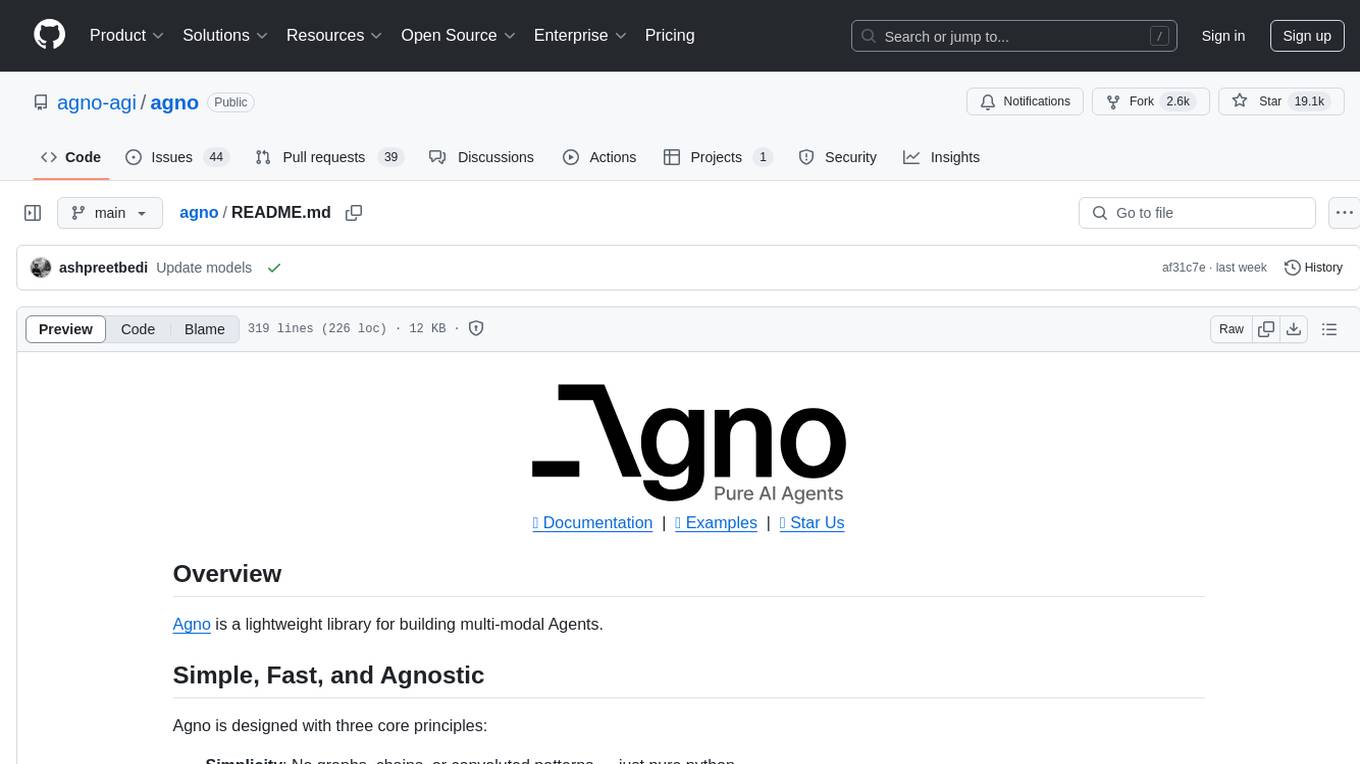
agno
Agno is a lightweight library for building multi-modal Agents. It is designed with core principles of simplicity, uncompromising performance, and agnosticism, allowing users to create blazing fast agents with minimal memory footprint. Agno supports any model, any provider, and any modality, making it a versatile container for AGI. Users can build agents with lightning-fast agent creation, model agnostic capabilities, native support for text, image, audio, and video inputs and outputs, memory management, knowledge stores, structured outputs, and real-time monitoring. The library enables users to create autonomous programs that use language models to solve problems, improve responses, and achieve tasks with varying levels of agency and autonomy.
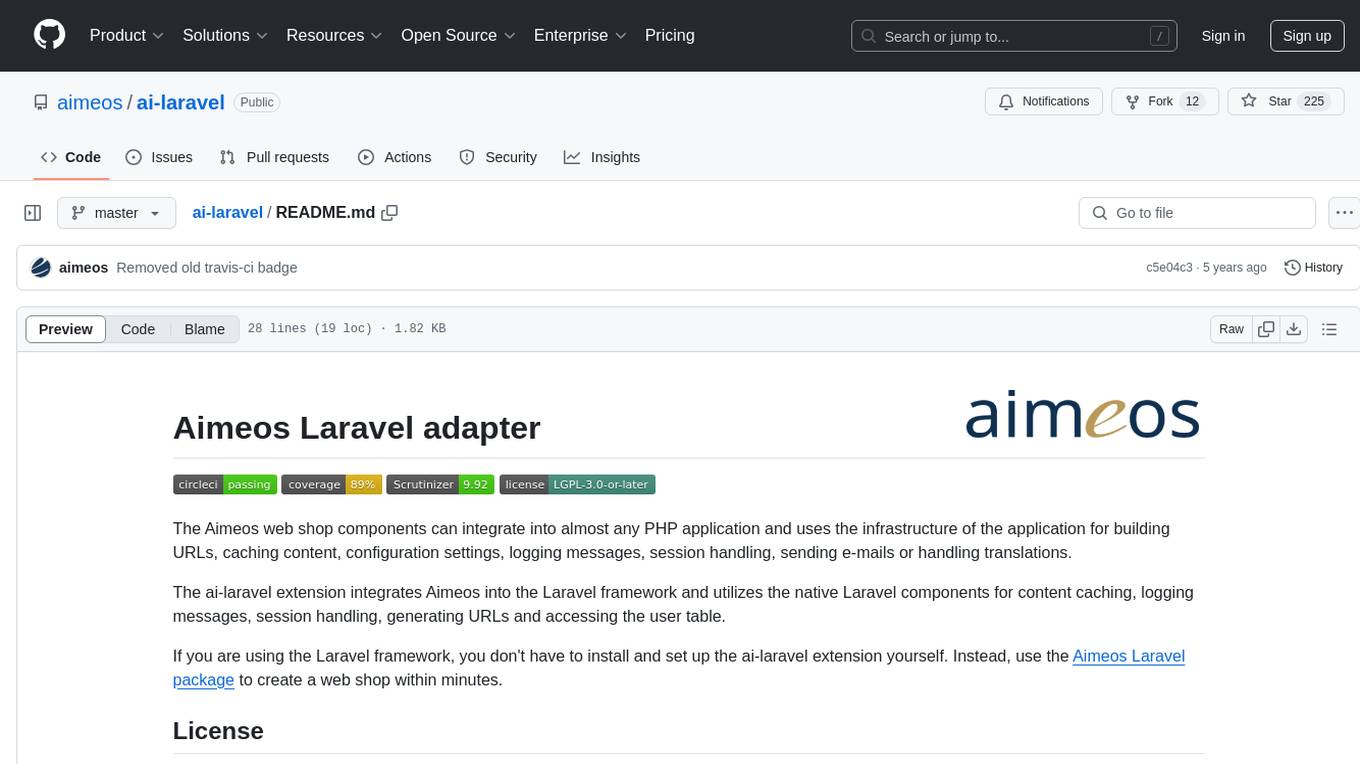
ai-laravel
The Aimeos Laravel adapter allows integration of Aimeos web shop components into Laravel framework, leveraging native Laravel components for content caching, logging messages, session handling, generating URLs, and accessing the user table. Users of Laravel can quickly set up a web shop using the Aimeos Laravel package, saving time and effort in installation and configuration. The adapter is licensed under LGPLv3 and offers seamless integration with Laravel infrastructure for various functionalities like URL building, caching, logging, session management, email sending, and translations.

CSGHub
CSGHub is an open source, trustworthy large model asset management platform that can assist users in governing the assets involved in the lifecycle of LLM and LLM applications (datasets, model files, codes, etc). With CSGHub, users can perform operations on LLM assets, including uploading, downloading, storing, verifying, and distributing, through Web interface, Git command line, or natural language Chatbot. Meanwhile, the platform provides microservice submodules and standardized OpenAPIs, which could be easily integrated with users' own systems. CSGHub is committed to bringing users an asset management platform that is natively designed for large models and can be deployed On-Premise for fully offline operation. CSGHub offers functionalities similar to a privatized Huggingface(on-premise Huggingface), managing LLM assets in a manner akin to how OpenStack Glance manages virtual machine images, Harbor manages container images, and Sonatype Nexus manages artifacts.
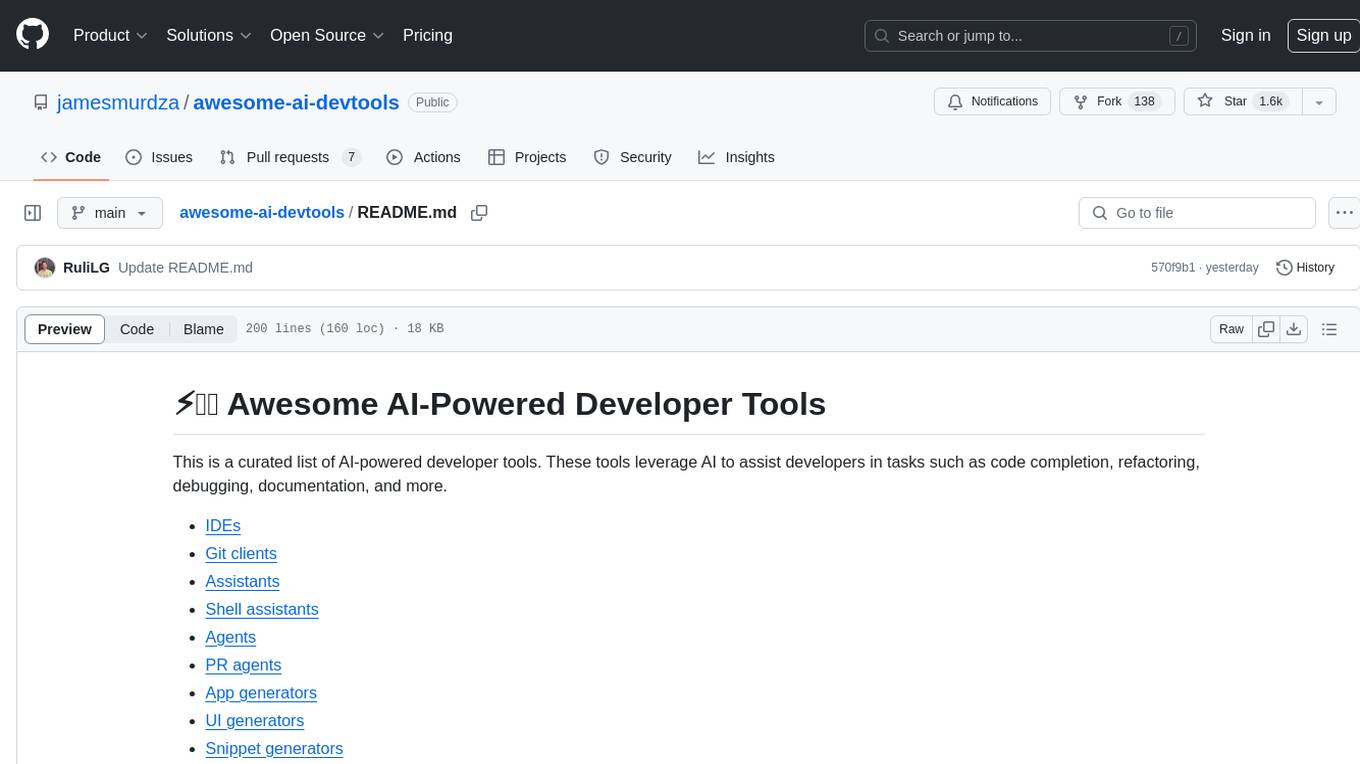
awesome-ai-devtools
Awesome AI-Powered Developer Tools is a curated list of AI-powered developer tools that leverage AI to assist developers in tasks such as code completion, refactoring, debugging, documentation, and more. The repository includes a wide range of tools, from IDEs and Git clients to assistants, agents, app generators, UI generators, snippet generators, documentation tools, code generation tools, agent platforms, OpenAI plugins, search tools, and testing tools. These tools are designed to enhance developer productivity and streamline various development tasks by integrating AI capabilities.
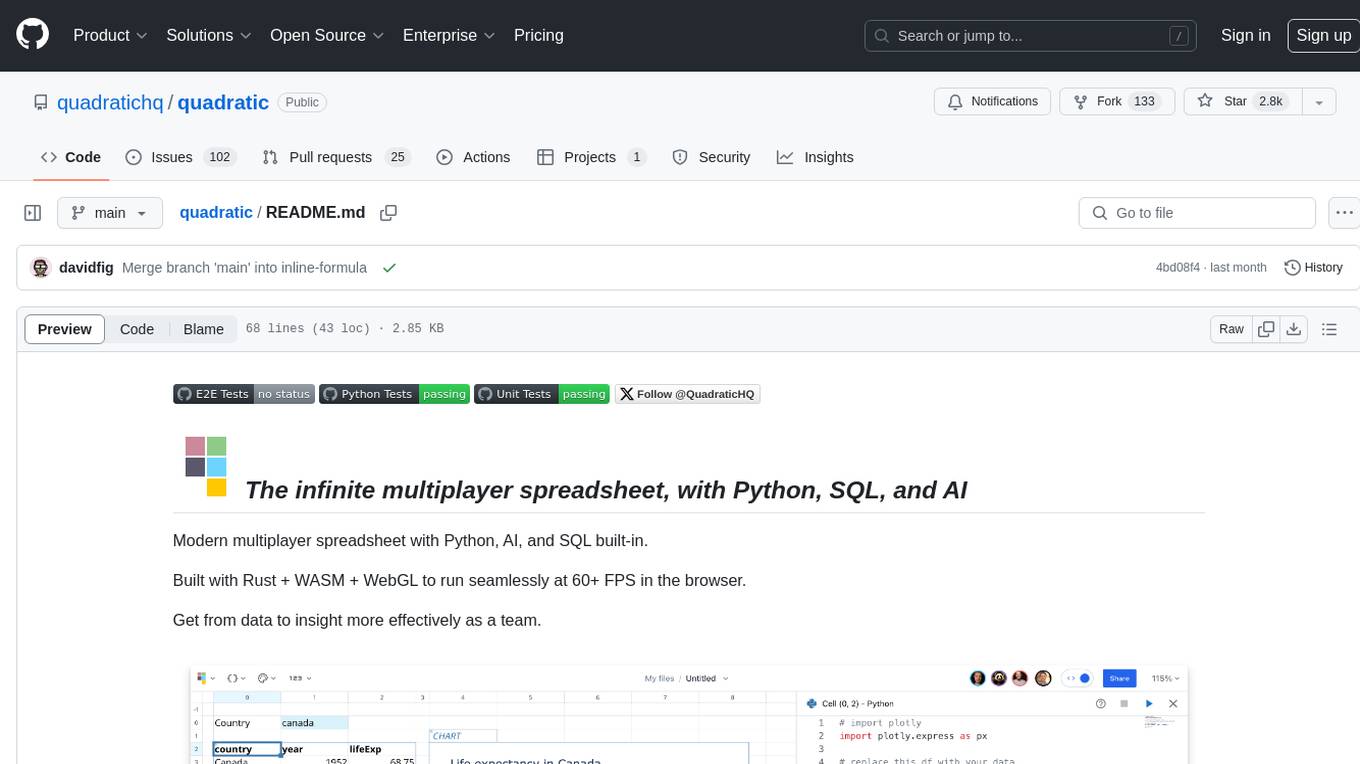
quadratic
Quadratic is a modern multiplayer spreadsheet application that integrates Python, AI, and SQL functionalities. It aims to streamline team collaboration and data analysis by enabling users to pull data from various sources and utilize popular data science tools. The application supports building dashboards, creating internal tools, mixing data from different sources, exploring data for insights, visualizing Python workflows, and facilitating collaboration between technical and non-technical team members. Quadratic is built with Rust + WASM + WebGL to ensure seamless performance in the browser, and it offers features like WebGL Grid, local file management, Python and Pandas support, Excel formula support, multiplayer capabilities, charts and graphs, and team support. The tool is currently in Beta with ongoing development for additional features like JS support, SQL database support, and AI auto-complete.
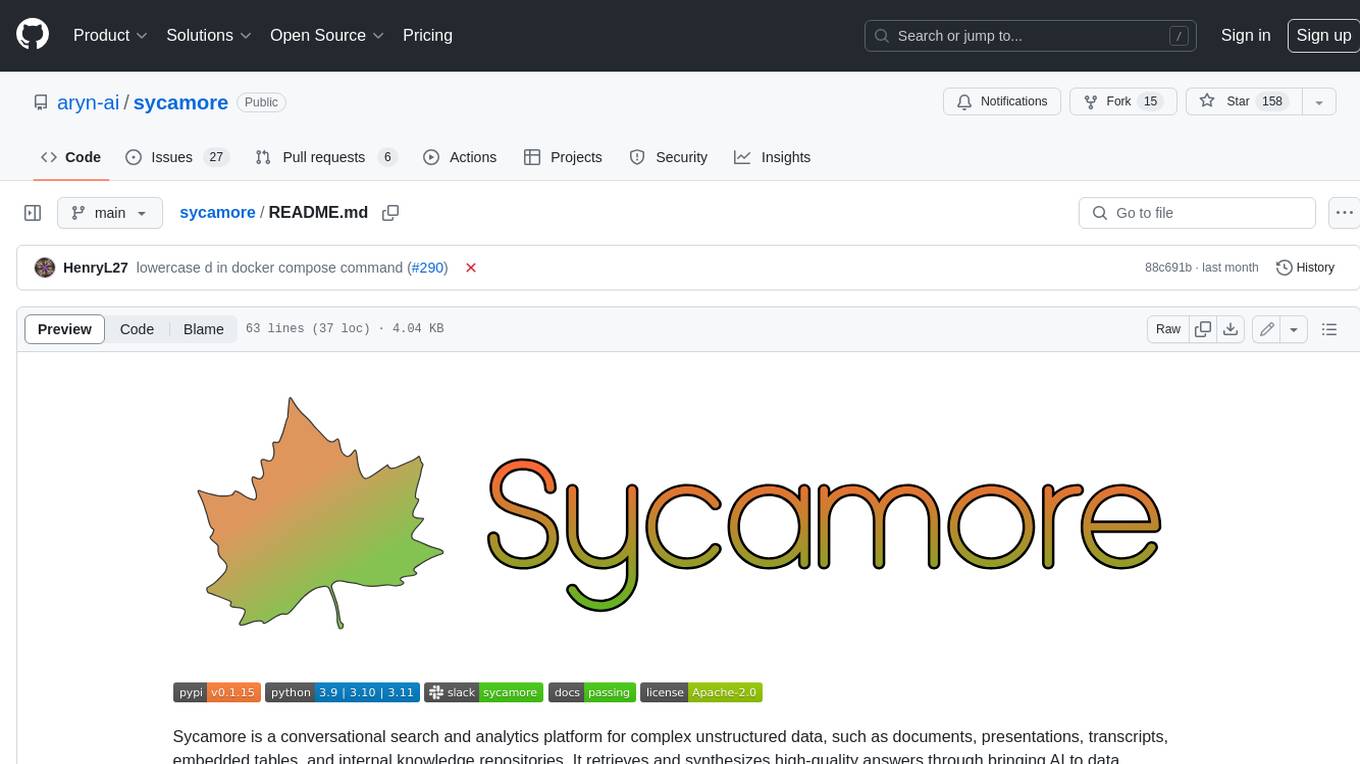
sycamore
Sycamore is a conversational search and analytics platform for complex unstructured data, such as documents, presentations, transcripts, embedded tables, and internal knowledge repositories. It retrieves and synthesizes high-quality answers through bringing AI to data preparation, indexing, and retrieval. Sycamore makes it easy to prepare unstructured data for search and analytics, providing a toolkit for data cleaning, information extraction, enrichment, summarization, and generation of vector embeddings that encapsulate the semantics of data. Sycamore uses your choice of generative AI models to make these operations simple and effective, and it enables quick experimentation and iteration. Additionally, Sycamore uses OpenSearch for indexing, enabling hybrid (vector + keyword) search, retrieval-augmented generation (RAG) pipelining, filtering, analytical functions, conversational memory, and other features to improve information retrieval.
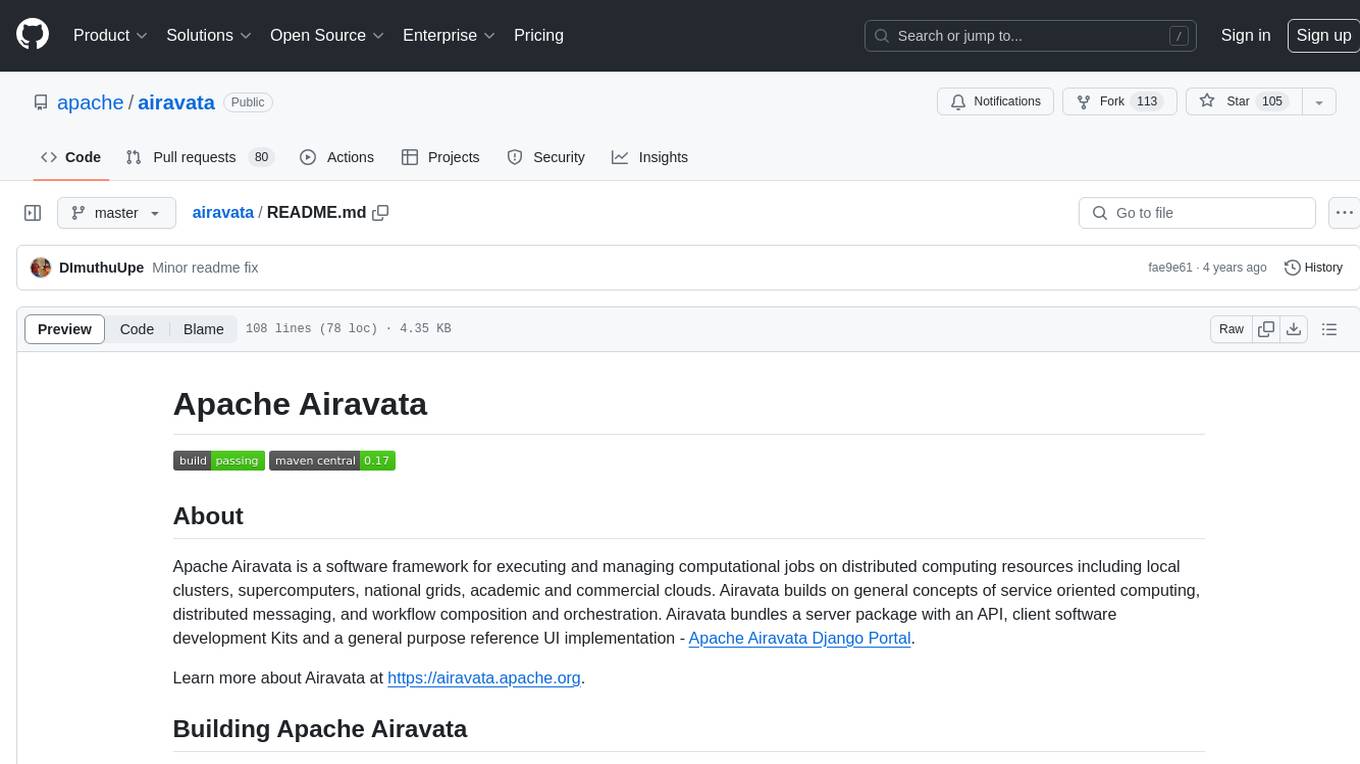
airavata
Apache Airavata is a software framework for executing and managing computational jobs on distributed computing resources. It supports local clusters, supercomputers, national grids, academic and commercial clouds. Airavata utilizes service-oriented computing, distributed messaging, and workflow composition. It includes a server package with an API, client SDKs, and a general-purpose UI implementation called Apache Airavata Django Portal.
For similar tasks

Azure-Analytics-and-AI-Engagement
The Azure-Analytics-and-AI-Engagement repository provides packaged Industry Scenario DREAM Demos with ARM templates (Containing a demo web application, Power BI reports, Synapse resources, AML Notebooks etc.) that can be deployed in a customer’s subscription using the CAPE tool within a matter of few hours. Partners can also deploy DREAM Demos in their own subscriptions using DPoC.

sorrentum
Sorrentum is an open-source project that aims to combine open-source development, startups, and brilliant students to build machine learning, AI, and Web3 / DeFi protocols geared towards finance and economics. The project provides opportunities for internships, research assistantships, and development grants, as well as the chance to work on cutting-edge problems, learn about startups, write academic papers, and get internships and full-time positions at companies working on Sorrentum applications.

tidb
TiDB is an open-source distributed SQL database that supports Hybrid Transactional and Analytical Processing (HTAP) workloads. It is MySQL compatible and features horizontal scalability, strong consistency, and high availability.

zep-python
Zep is an open-source platform for building and deploying large language model (LLM) applications. It provides a suite of tools and services that make it easy to integrate LLMs into your applications, including chat history memory, embedding, vector search, and data enrichment. Zep is designed to be scalable, reliable, and easy to use, making it a great choice for developers who want to build LLM-powered applications quickly and easily.

telemetry-airflow
This repository codifies the Airflow cluster that is deployed at workflow.telemetry.mozilla.org (behind SSO) and commonly referred to as "WTMO" or simply "Airflow". Some links relevant to users and developers of WTMO: * The `dags` directory in this repository contains some custom DAG definitions * Many of the DAGs registered with WTMO don't live in this repository, but are instead generated from ETL task definitions in bigquery-etl * The Data SRE team maintains a WTMO Developer Guide (behind SSO)

mojo
Mojo is a new programming language that bridges the gap between research and production by combining Python syntax and ecosystem with systems programming and metaprogramming features. Mojo is still young, but it is designed to become a superset of Python over time.

pandas-ai
PandasAI is a Python library that makes it easy to ask questions to your data in natural language. It helps you to explore, clean, and analyze your data using generative AI.

databend
Databend is an open-source cloud data warehouse that serves as a cost-effective alternative to Snowflake. With its focus on fast query execution and data ingestion, it's designed for complex analysis of the world's largest datasets.
For similar jobs

lollms-webui
LoLLMs WebUI (Lord of Large Language Multimodal Systems: One tool to rule them all) is a user-friendly interface to access and utilize various LLM (Large Language Models) and other AI models for a wide range of tasks. With over 500 AI expert conditionings across diverse domains and more than 2500 fine tuned models over multiple domains, LoLLMs WebUI provides an immediate resource for any problem, from car repair to coding assistance, legal matters, medical diagnosis, entertainment, and more. The easy-to-use UI with light and dark mode options, integration with GitHub repository, support for different personalities, and features like thumb up/down rating, copy, edit, and remove messages, local database storage, search, export, and delete multiple discussions, make LoLLMs WebUI a powerful and versatile tool.

Azure-Analytics-and-AI-Engagement
The Azure-Analytics-and-AI-Engagement repository provides packaged Industry Scenario DREAM Demos with ARM templates (Containing a demo web application, Power BI reports, Synapse resources, AML Notebooks etc.) that can be deployed in a customer’s subscription using the CAPE tool within a matter of few hours. Partners can also deploy DREAM Demos in their own subscriptions using DPoC.

minio
MinIO is a High Performance Object Storage released under GNU Affero General Public License v3.0. It is API compatible with Amazon S3 cloud storage service. Use MinIO to build high performance infrastructure for machine learning, analytics and application data workloads.

mage-ai
Mage is an open-source data pipeline tool for transforming and integrating data. It offers an easy developer experience, engineering best practices built-in, and data as a first-class citizen. Mage makes it easy to build, preview, and launch data pipelines, and provides observability and scaling capabilities. It supports data integrations, streaming pipelines, and dbt integration.

AiTreasureBox
AiTreasureBox is a versatile AI tool that provides a collection of pre-trained models and algorithms for various machine learning tasks. It simplifies the process of implementing AI solutions by offering ready-to-use components that can be easily integrated into projects. With AiTreasureBox, users can quickly prototype and deploy AI applications without the need for extensive knowledge in machine learning or deep learning. The tool covers a wide range of tasks such as image classification, text generation, sentiment analysis, object detection, and more. It is designed to be user-friendly and accessible to both beginners and experienced developers, making AI development more efficient and accessible to a wider audience.

tidb
TiDB is an open-source distributed SQL database that supports Hybrid Transactional and Analytical Processing (HTAP) workloads. It is MySQL compatible and features horizontal scalability, strong consistency, and high availability.

airbyte
Airbyte is an open-source data integration platform that makes it easy to move data from any source to any destination. With Airbyte, you can build and manage data pipelines without writing any code. Airbyte provides a library of pre-built connectors that make it easy to connect to popular data sources and destinations. You can also create your own connectors using Airbyte's no-code Connector Builder or low-code CDK. Airbyte is used by data engineers and analysts at companies of all sizes to build and manage their data pipelines.

labelbox-python
Labelbox is a data-centric AI platform for enterprises to develop, optimize, and use AI to solve problems and power new products and services. Enterprises use Labelbox to curate data, generate high-quality human feedback data for computer vision and LLMs, evaluate model performance, and automate tasks by combining AI and human-centric workflows. The academic & research community uses Labelbox for cutting-edge AI research.



